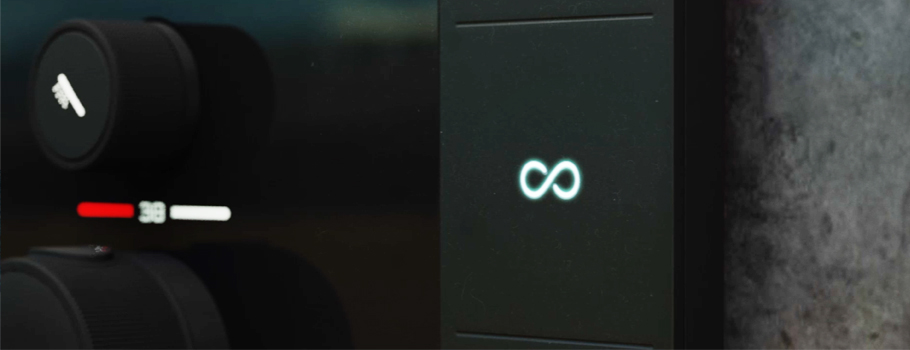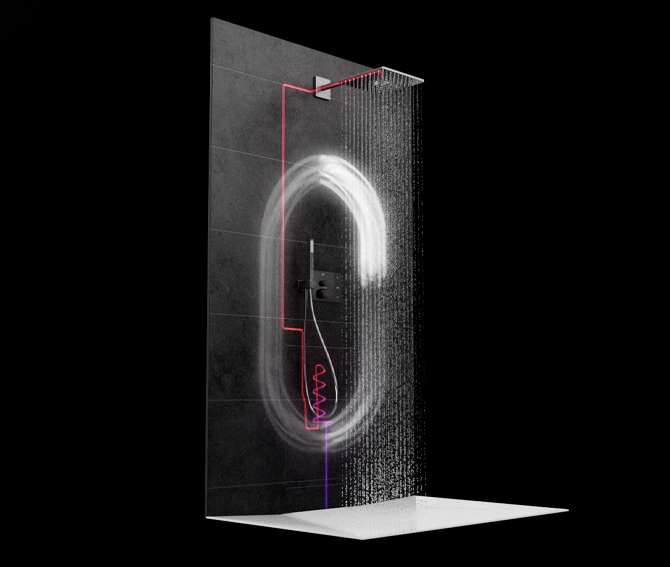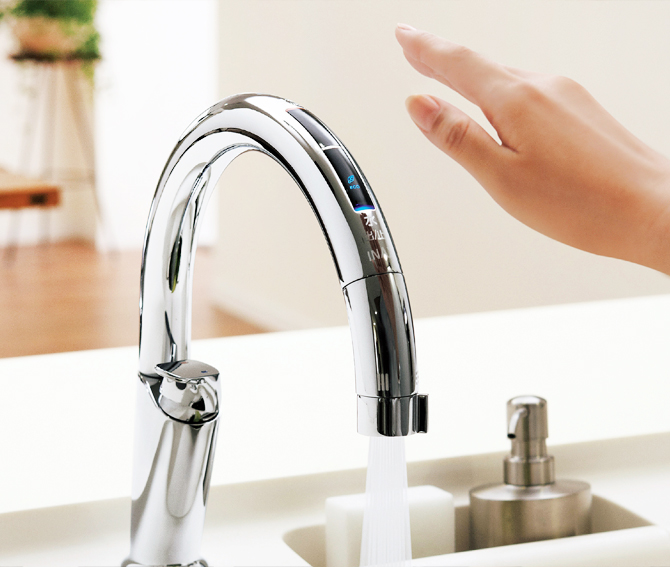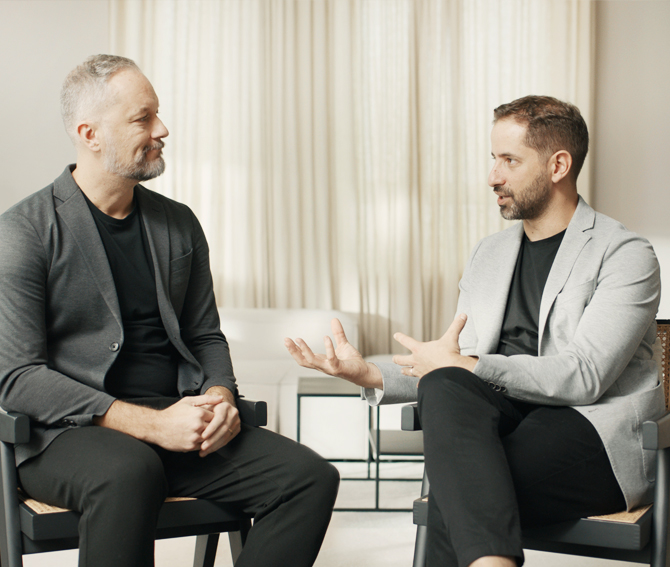LIXIL makes pioneering water and housing products that solve everyday, real-life challenges, making better homes a reality for everyone, everywhere.
- Global Site
-
- English
- Japanese
- Brand Sites
Global
- Global Site
-
- English
- Japanese
- Brand Sites

Imagine a button in your shower that would allow you to save water and energy without you noticing a single difference to your showering experience.
Would you press that button?
It’s a question all users of the Everstream, an upcoming water-recycling shower from LIXIL brand GROHE, will have to ask themselves.

Everstream, a water-recycling shower from LIXIL brand GROHE
By activating the shower’s recycling mode – once they have finished using shampoo or soap - they will enable the Everstream to gather water as it goes down the drain instead of letting it go to waste. It will then pump this water back into the shower system, purify it until it is clean and fresh again, and release it for re-use.
While an average conventional shower consumes around 120 liters of fresh water in 10 minutes, the Everstream would enable users to consume as little as 30 liters – leading to an overall water saving of up to 75%. Using recycled water can also reduce energy consumption by up to 66% compared with a conventional shower, because it reduces water heating requirements.
Making the user have to decide to activate the water recycling mode rather than just reducing flows as standard – although the shower does have other automatic water-saving technologies in place – is a conscious design choice. It requires increased awareness of the need to act more sustainably and helps people understand how behavioral change will play a key role in solving the world’s water challenges.
Unsustainable water use is contributing to water shortages across the globe. Almost one in three Europeans is affected by water stress in an average year1, and 90% of children in the Middle East and North Africa live in areas of high water stress.2
“We owe it to our children and grandchildren to change the way we think about water, and how we use it and take care of it,” says Jonas Brennwald, Leader, LIXIL EMENA, who describes sustainability as part of LIXIL’s DNA. “There is no reason not to act. We have an obligation to make a difference for future generations.”
The Everstream shower helps consumers make that difference.
Changing Consumer Habits
In Europe, bathrooms account for around two-thirds of household water use3, notes LIXIL’s Duarte Salvador, Leader of Design Creative Direction, EMENA, and it’s a fact that is guiding the direction of his work. “Innovative technologies like Everstream consume just a quarter of the water compared with a traditional shower system,” he says.
The energy crisis and its effects on water heating bills have already led some people to change their showering habits. A survey commissioned by LIXIL’s GROHE brand finds that people in the Netherlands, Germany, and Spain are increasingly opting for shorter, colder showers. But there remain a lot of people – particularly in the US and UK – who are not looking for ways to cut their water or energy use in the bathroom.
One of the best ways to change consumer behavior is to make it easy for that change to happen.4 Creating a shower that provides all the comfort of a regular showering experience but is more sustainable at the same time is a way to do that.
“This is where our responsibility as a manufacturer comes into play,” says Brennwald. “Who are we to tell consumers what they should or shouldn’t do? Who are we to tell you to have a colder and shorter shower? It is on us to develop the technologies that will make change happen. We need to enable every single consumer to be more sustainable.”

LIXIL’s Navish Hands-Free Faucet
The areas where LIXIL is innovating to reduce water consumption also include sanitation technologies, such as water-saving toilets and smart water controllers. The Studio S toilet from LIXIL brand American Standard uses just 1 gallon of water per flush5 – almost 40% less than the US industry standard of 1.6 gallons6 – thanks to its innovative PowerFlo flushing technology.
Innovations such as LIXIL’s Navish Hands-Free Faucet use sensor technology to make this happen in a way that means the consumer doesn’t even have to think about it. By automating when water starts and stops flowing, consumption can be cut by 30% compared with traditional faucets.
Protecting Water through Technological Advances
Different regions are facing different kinds of water problems. As well as more and more countries all over the world facing droughts7, over half of the global population lacks safely managed sanitation services8, and 44% of worldwide household wastewater is not safely treated, which can lead to outbreaks of disease.9
The United Nations Sustainable Development Goal 6 underlines the importance of access to water, sanitation, and hygiene for all, and the protection of water resources. This is a basic human right, and LIXIL aims to play a part in helping achieve this by making more sustainable homes a reality for everyone, everywhere.
As well as creating a range of products that enable people across different countries and cultures to use water in more sustainable, smarter, and safer ways, LIXIL has also put in place actions to improve its own water efficiency, recycle water and manage wastewater at its factories.

Right: Duarte Salvador, Leader of Design Creative Direction, EMENA
“Better living is at the heart of our business, and to achieve that we have to allow people to do more with less in order to preserve our resources,” says Salvador, who has been with LIXIL for almost a decade and helped the brand win numerous design awards.
Salvador not only worked on the water-recycling shower, but has also been involved in the development of a showerhead that cuts water flow by 50% without the user even noticing. The EcoJoy does this thanks to a special flow-restrictor and aerator, and the reduced water consumption also means less hot water is used and therefore less energy.
A New Sustainability Benchmark
There is no single solution to the world’s growing water scarcity problem. It is a global issue, affecting everyone, and we all need to pull together to improve the situation.
The Everstream water-recycling shower is one way LIXIL aims to contribute to the solution. It is a step change in innovation that creates a new pathway to sustainability.
“Our technology will change the way we use water without compromising our comfort,” says Brennwald. “It means everyone can reduce their resource use, even those who are not ready to change their behavior.”
Our Stories
- Backing People and Passions to Drive Innovation
- How Toilets in Schools are Catalyzing Change in Communities
- Building the Future by Recycling the Past
- Reinventing Consumer Connections in the World's Largest E-commerce Market
- Tackling Household Water Inefficiency in a Water-Stressed World
- Plugging the Plumber Shortage
- Pioneering Solutions to a Sewage Crisis in Rural Alabama
- Meet the Citizen Developers Changing How We Work
- Design and Brand Identity Transformation at LIXIL
- Three Changes to Prepare Europe’s Sanitary Industry for Growth
- Three Steps to Creating an Inclusive Culture
- From Linear to Circular: Giving Products in Your Home a New Lease of Life
- Crafting Unique Experiences as well as Products
- GROHE X: A Digital Brand Experience
- Design-led Innovation Delivering True Value
- Responsible Use of Plastics
- Empowering our People for an Agile Future
- Turning the Waves of Change into Opportunities
- SATO Tap: a New Handwashing Solution for All
- New Ways of Working Take Flight at LIXIL
- INAX: Rituals of Water
- Refreshing our sanitation targets, standing firm on our commitments
- Developing Attractive and Differentiated Products
- Conserving Water: The New Normal
- Insulating For a Warmer and Healthier Home
- Open Kitchen, Open Communication
- Tackling Open Defecation in India
- Shaping the Future of Faucets, One 3D Layer at a Time
- Bathed in Culture and Tradition
- Remodeling the Housing Market
- LIXIL's AQUA CERAMIC makes bathroom stains a thing of the past
- The Technology of Water
- Tackling Challenges in Global Sanitation and Hygiene
